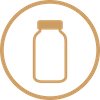The trace element iron is essential for oxygen transport in the blood, cellular respiration and maintaining the immune system and normal cognitive performance. Iron is found in large quantities in legumes, meat and cereal products, although in the latter it is often in a less bioavailable form. In addition to children and adolescents, women of childbearing age (especially during pregnancy and breastfeeding) and athletes should have their iron levels checked regularly and ensure that they have a sufficient iron intake.
High bioavailability: combination with cofactor vitamin C
Three organic iron sources are combined in our iron complex. The combination of different iron sources with different properties and absorption rates has a particularly beneficial effect on overall bioavailability. In addition, iron absorption is optimised by buffered vitamin C (calcium ascorbate), as vitamin C also contributes to improved iron absorption.
Iron metabolism and haematopoiesis: synergistic cofactors
Our iron complex is rounded off with copper for functioning iron transport and B vitamins for synergistic support of blood formation.
According to the European Food Safety Authority (EFSA):
Iron contributes to:
- normal cognitive function
- normal energy metabolism
- normal haemoglobin and red blood cell production
- normal oxygen transport
- normal immune system functioning
- reduction of tiredness and fatigue
Vitamin C contributes to:
- improved iron absorption.
Copper contributes to:
- normal iron transport in the body.
Vitamin B contributes to:
- the normal formation of red blood cells (folate, vitamin B6 and B12),
- the maintenance of normal red blood cells (riboflavin).





















